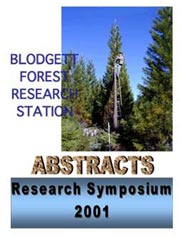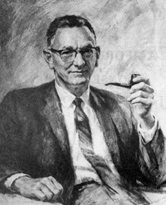 |
||||||||||||||
|
||||||||||||||
| 2001 Blodgett Forest Research Symposium |
| Research Projects | Research Publications | Back to TABLE OF CONTENTS |
|
|||||
The combination of an enticing environment, a strong forestry program at University of California, Berkeley, and the desire to leave home brought Henry J. Vaux to California in 1933. Raised in suburban Philadelphia, Vaux was granted a Bachelor of Science, Physics, from Haverford College in 1933. The nation was still feeling the effects of the Great Depression and unemployment was widespread. Forestry and conservation were just being brought to public attention. "Hank" had already decided he was not cut out to be a physicist, and thought a future in forestry "sounded entertaining". Vaux was one of the first to see much of Blodgett Forest after the University’s acquisition. Vaux spent the summer of 1935 on Blodgett Forest, completing the Forest’s first inventory. His cruising instructions were to cruise anything over a 6-inch diameter. Very few such trees existed. Large trees standing were in poor condition. The young growth was magnificent, but very small. According to Hank, there "wasn’t a respectable tree on the place!" The University conferred Master of Science, Forestry on Vaux in 1935 and he moved into the professional ranks of foresters, first with the Crown Willamette Paper Company in the Northwest. He accepted a faculty position at Oregon State College in 1937 and began his impressive reputation as an educator and an architect of this state’s forestry practices. He moved on to work on a doctorate. World War II saw him in the U.S. Naval Reserve before returning to academia. Vaux was given his Ph.D. in Agricultural Economics in 1948, one of the first five professional foresters in the United States to complete a Ph.D. in economics or agricultural economics, and was promptly appointed lecturer in the School of Forestry. Promotion to associate professor followed in a mere two years, then to full professor three years after that. He strongly promoted instruction and research in forest economics and forest policy in the School of Forestry. Vaux was appointed third Dean of the School of Forestry in July 1955. As dean, he proposed the establishment of the Wildland Research Center in 1958, served as its first director and was instrumental in a significant wilderness study conducted by the Center. During Vaux’s tenure, the School of Forestry budget increased four-fold, outside revenue sources increased dramatically, and the number of regular academic positions doubled. A Berkeley graduate, active in the timber business, suggested to Dean Vaux in 1956 that the timber growing on Blodgett Forest could be harvested and sold for substantial profit. Vaux considered the thought had great merit and put in motion the first timber harvest at Blodgett under the University’s ownership. Stumpage receipts were retained in the department to support forest properties’ research and administration. In spite of his rigorous schedule, Hank also served as an honorary member of the State Board of Forestry. He was part of the team that drew up the Z’berg Bill, proposed to regulate forest practices. After ten years as Dean, Vaux returned to teaching, but remained active with the Board. He was appointed Board Chairman in 1976, and embarked on reorganization and board independence. Although he didn’t consider his evaluation of water’s importance in forestry economics as particularly unusual, Vaux played a major role in public and educational recognition of water as a primary factor. Many of Hank’s prolific writings concern watersheds and water distribution factors. Vaux retired from teaching in 1978, and from the Board of Forestry in 1983. His talents for conflict resolution, dedication to developing workable solutions and devotion to the advancement of Forestry have marked him as a leader for all natural resource professionals to emulate. |
|||||
|
|||||
|
University of California Center for Forestry, UC Berkeley. Last modified: 6/27/02 ©Copyright, 2001. The Regents of the University of California. For questions and comments, contact webmaster. |

